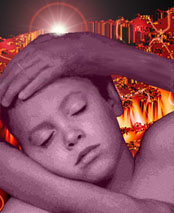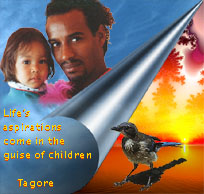|
Pathways to Peace Honoring in Actionby Victor La Cerva, MD |
| Article
#5
in our series Creating Less Violence |
 |
| Victor La Cerva, MD, the Mediacl Director of the Family Health Bureau of the State of New Mexico, retired, is the author of two books, a figurehead in the Men's Wellness movement and father of two lovely teenagers. Victor lectures nationally on violence prevention and shares his expertise and experiences with visitors to this segment of Pathfinders.
For
information contact us at: pathways@dwij.org
|
|
Honoring in Action Many cultures around the world have unique ways of honoring their children. In Bali, for example, there is the celebration known as Nyambutan, a ceremony when a baby is first allowed to touch the ground. Until a few months of age, babies are believed to still be part of the spirit world, and are carried everywhere. The Navajo people have chidelglo, a special celebration of a baby's first laugh; the party is put on by whomever first elicited the laughter, which is revered as a special form of prayer. The Boran people of Kenya embody the "takes a village" theme, as they gather for a two day long special naming and welcoming event known as the Jilla. In any culture, the blessings of a young baby sometimes get lost in the difficulties of endless caretaking. The fatigue, frustration and possibly, lack of experience of caretakers sometimes slip over into abusive behavior, even when the initial bonding connection is well established. Recently, touring Disneyland at the end of a long day, I was with my two daughters, then aged 8 and 12, a cousin and her boyfriend. It was hot and sticky in that East Coast kind of way, and though everyone was exhausted we decided to stay for the fireworks finale. A few feet in front of us was another family with much younger children, who appeared to be in a more advanced stage of exhausted-clinging-crying-why-are-we-still-here?-dom. Both parents were yelling at the two children, and finally the father whacked the toddler, who fell to the ground, upping the level of crying to a new decibel range before climbing Dad's leg as the fireworks begin and the violence simmered. My cousin's girlfriend wanted to punch the Dad's lights out, and my children were paying more attention to this spectacle than to the cascade of brilliant colors overhead. What to do? A
Pediatrician in Colorado, looking at ten years of fatal child abuse
data, found that over 90% of such tragedies were triggered by seven
normal developmental phases:
These
seven situations are when new parents are most likely to have a
tantrum themselves, doing damage to their young by shaking, hitting
or worse.
Sometimes such anger flows in public places. Many of us have witnessed a child being hit, grabbed, or spoken to harshly in a park, restaurant or grocery store. Perhaps we felt our own anger rise in witnessing such treatment. Maybe we slipped into negatively judging that caregiver in our minds, smugly reassuring ourselves that we would never do that. If there was an urge to intervene, what prevented us from becoming involved? I have personally responded to many of these situations, so that it seems second nature to me now. Here are my suggested ABC's of action in such situations: A. Approach in a calm, non judgmental-manner. If you are about to get in someone's face because of how they are treating their child, better to continue down your own grocery aisle, rather than create more suffering by adding your anger to the mix.
I used some of these same principles in handling the Disneyland situation. In doing so, I modeled for my children an important lesson about standing up for what one believes, in a way that honors the basic philosophy of primum non nocere. Above all else, in your attempts to help, try to do no harm. Victor La Cerva, MD ©Victor
La Cerva 2000
|
|
|
|
